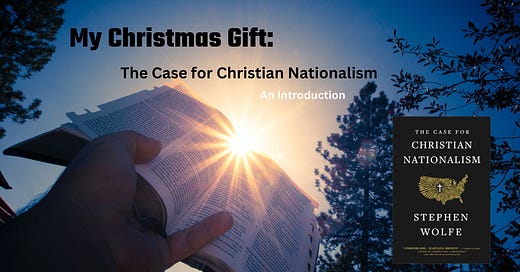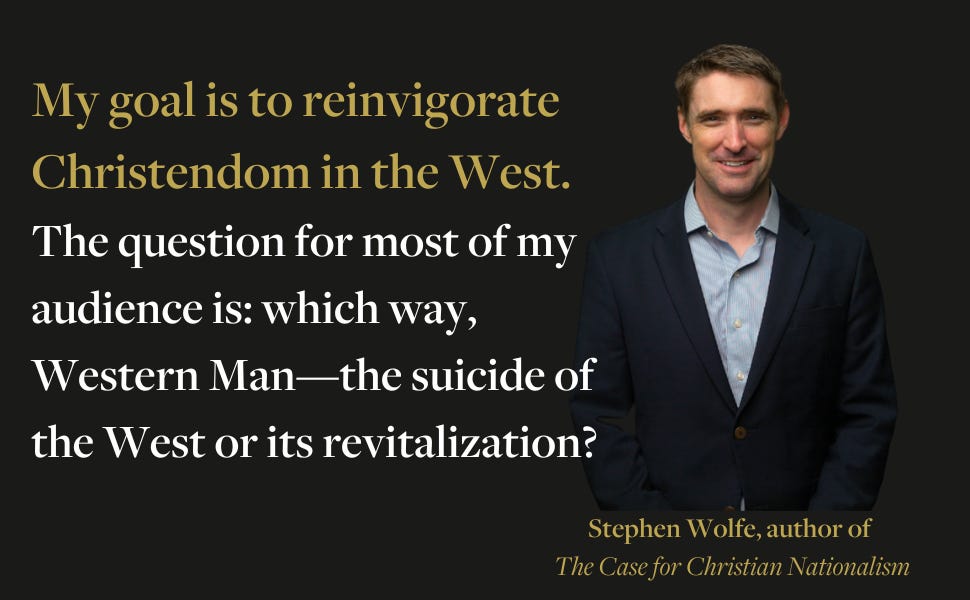My Christmas Gift: The Case For Christian Nationalism
Introducing the latest craze in far right-wing Christian extremism
My sister-in-law was smart, and asked my wife what I might want for Christmas. She suggested the new book from Stephen Wolfe, The Case for Christian Nationalism, which has been the talk of Twitter for a few weeks now. The book, which the author envisions as not just a defense of Christian Nationalism but also a starting point for reformed Christian social and political action, is one of the first to be published by an advocate of Christian Nationalism in recent times. It is unabashed in its support of Christian Nationalism, along with all of its attendant beliefs, including anti-feminism, ethnic separatism, theocratic civil rule, and barely fig-leaved white supremacy. I’m hoping to do a series on the book as I work my way through it, starting today with the Introduction, though I may decide to put a few of the posts behind the paywall.
The first thing to note about this book is that the author seems to have a rather high view of his arguments, and a rather dim view of any objections that may arise; intellectual humility does not seem to interest Wolfe. Gliding right over the part where the author suggests that Christians who were opposed to the January 6th, 2021 insurrection in Washington, D.C., had succumbed to the civil religion of Western social dogmas rather than true Christianity (p. 5), Wolfe takes direct aim at the recent spate of sociologists who have been working on the issue of Christian Nationalism for some time now. He says,
The most recent discourse around Christian nationalism is both negative and almost always ascribed to white Americans. Indeed, it is often called "white Christian nationalism." Philip Gorski and Samuel Perry recently published “The Flag and the Cross: White Christian Nationalism and the Threat to American Democracy.” Their definition is a "constellation of beliefs," which is technically not a definition, and the unstated point of the book is certainly to secure the term's negative connotations by associating it with social views. Since it is largely a work of (activist) sociology, its content is mostly irrelevant to the content of this book. They disregard and dismiss the reasons for Christian nationalist beliefs and instead rely on racial explanations, such as "whiteness," to account for Christian nationalism. My intent here is neither to defend nor reject what they consider Christian nationalism, nor to denounce or distance myself from its alleged connotations. This is a work of Christian political theory, not sociology. If the social scientists wish to critique my book, they must step out of social science, suspend their belief in social dogma, and enter rational inquiry. (p. 8)
While there are indeed problems with Gorski and Perry’s definition, which I acknowledge in next draft of the paper I am writing on Christian Nationalism,1 the dismissal of sociology as ‘activist’ does much of the work in this paragraph. That said, this paragraph reveals something interesting that I wanted to highlight, namely, the extent to which the public proponents of Christian Nationalism, “neither [desire] to defend nor reject what they consider Christian nationalism, nor to denounce or distance myself from its alleged connotations.” In other words, the author is not interested in acknowledging the role that whiteness and/or white supremacy play in the ‘constellation of beliefs’ that make up Christian Nationalism, but neither is he interested in denying that those ideas are important to the Christian Nationalist.
Moreover, the idea that what Wolfe is doing is ‘rational inquiry’ is laughable on its face. In fact, Wolfe tells us why in his section on methods:
I call this a work of Christian political theory because I rely on both natural and supernatural propositions-i.e., from what is true from nature and from revelation - and I integrate them in my arguments. My method seeks not to prove the same proposition from reason and revelation separately but to integrate natural and supernatural truth into a systematic political theory. So throughout this work I use mixed syllogisms, referring to syllogisms in which one premise is known by reason and the other known only by faith. For example, assuming that civil leaders ought to order the people to the true God (a natural principle), we can conclude that civil leaders ought to order the people to the Triune God. Why? Because the Triune God is the true God (a supernatural truth). I integrate natural principles and supernatural truths such that nature is applied and fulfilled by means of supernatural truth." In this way, revealed theology serves to complete politics, but it is not the foundation of politics. (p 18-19)
In other words, Wolfe’s idea of ‘rational inquiry’ is to purposefully and willfully mix faith-based premises with rational premises and call them ‘mixed syllogisms.’ The only problem for Wolfe is that this isn’t a thing - while my knowledge of logical systems is not exhaustive, I don’t know of any rational logical system in which you can simply add a premise that you have assumed to be true based solely on belief in a particular kind of deity. Wolfe is explicit that he is talking about belief in the ‘Triune God,’ a specifically Christian theological belief, for which the evidence is found in the Christian Bible and early Christian theological argument. Wolfe suggests that his use of ‘mixed syllogisms’ allows revealed theology to complete politics, rather than acting as it’s foundation. I would suggest that Wolfe has this completely backwards - given that Wolfe’s idea of rational inquiry requires supernaturally revealed premises in order to work, it is really those premises that are doing the heavy lifting - indeed, Christian Nationalism wouldn’t be a thing without the explicitly Christian beliefs that take centre stage.
While the rest of bulk of introduction is given over to briefly explicate the definition of Christian Nationalism that Wolfe is using, which I will highlight below, the author also takes a high level view at the chapters in the book. I won’t say too much about this here, except to note that there are seem to be many, many unsupported assumptions being made in support of a particular view. While I am not particularly hopeful that Wolfe will offer the evidence for his views, if only because of the fact that, uh, mixed syllogisms aren’t actually rational inquiry, I am looking forward to being surprised.
I will leave you with the definition that Wolfe is working with - you can decide for yourselves whether you want to follow along with me as I read through the most recent polemic in support of Christian Nationalism.
Christian nationalism is a totality of national action, consisting of civil laws and social customs, conducted by a Christian nation as a Christian nation, in order to procure for itself both earthly and heavenly good in Christ.
I look forward to working through this book in further detail over the coming weeks. I hope you’ll come along for the ride!
All FREE subscribers have access to Dinner Table Digests, and to any past content that has been made available to everyone.
A paid subscription nets you Special Edition Digests (like this recent edition on Abortion Rights), my Peter, What Books Are You Reading series, original essays, and acerbic social commentary. Become a supporter of my work today!
I am grateful for your support, and your eyeballs; I look forward to producing interesting and engaging content in the future. I would be especially honoured if you would consider donating $5 per month so that I can continue to create more excellent work in the future. And, of course, if you have any ideas about what you would like to see among the special content, I am all ears!
You can read the first draft here






